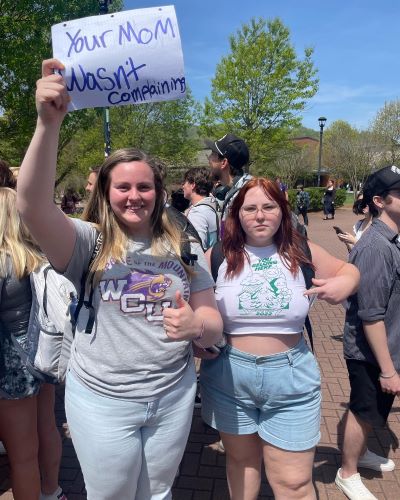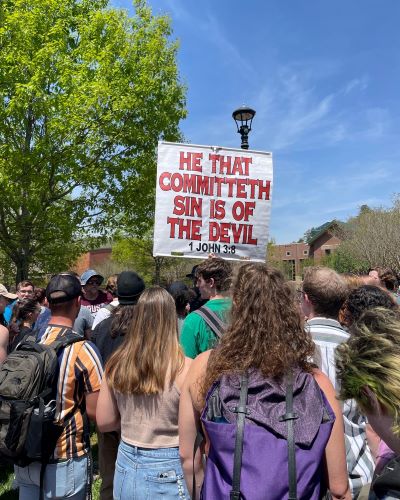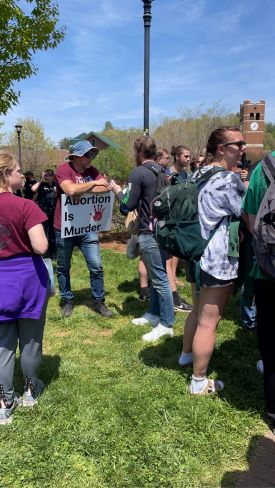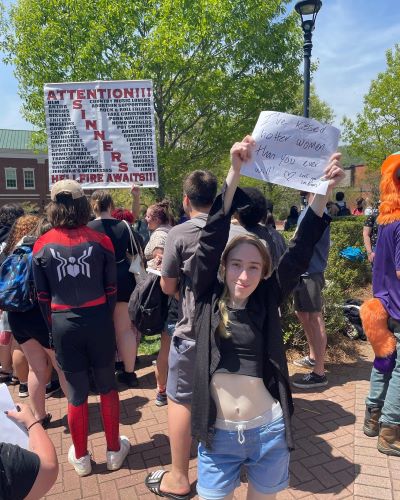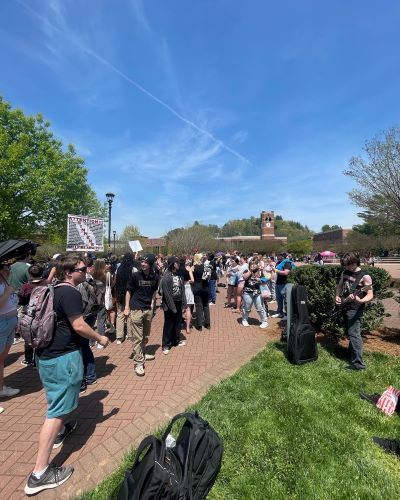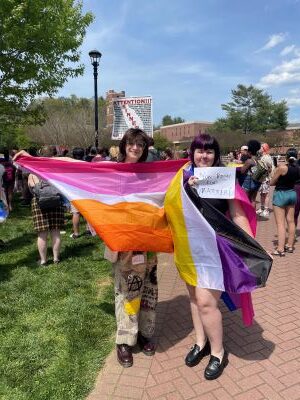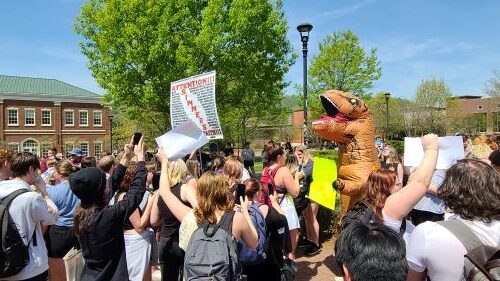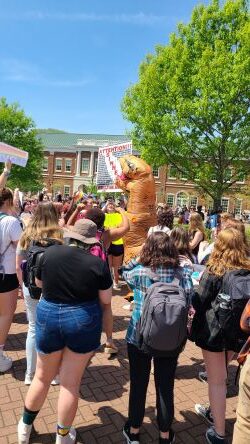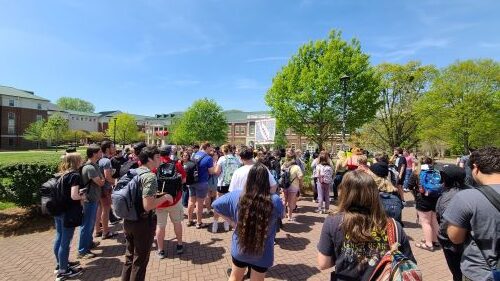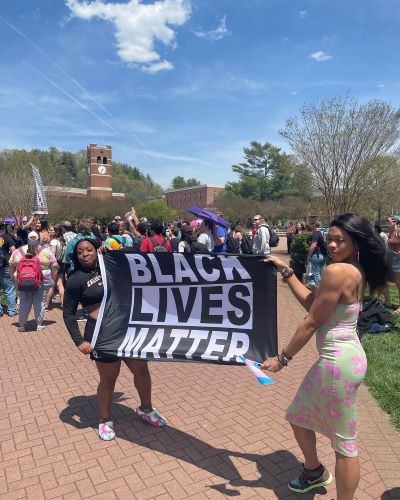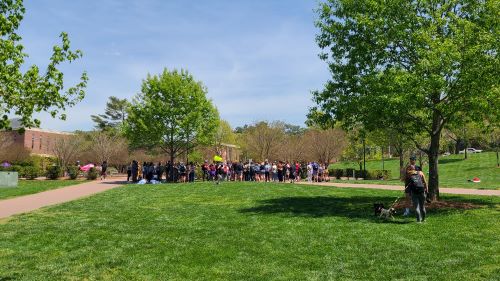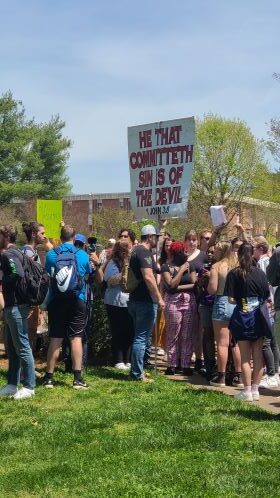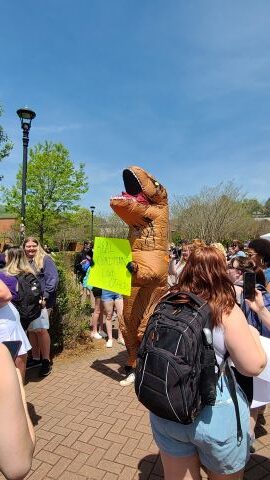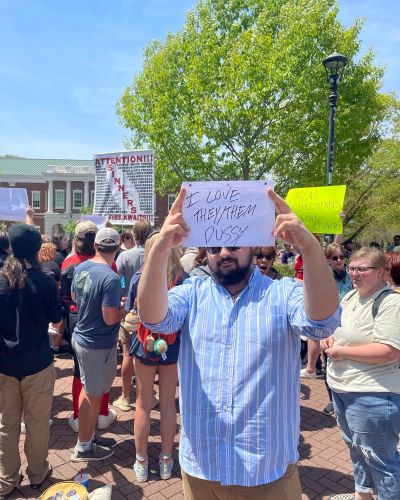Protesters against LGBTQ+ rights came to WCU campus on Wednesday, April 20. Approximately, 100 WCU students gathered in between classes to protest against them as they did not welcome the protestors on campus.
The protest took place between the dining hall and the Catafountain. The event was unknown to students. The three protestors were holding signs and cameras, standing within three feet of one another while students surrounded them. It is unknown what organization the protestors may be apart of. The protest began in the afternoon and went through the evening.
Students gathered to hold signs, play music and make commentary expressing their beliefs.
“I hate that in the class I just came from, we actually had to warn people coming out because there are so many people on campus that might have, like, life experiences where this would be genuinely scary,” says Beetle Juice, a student in attendance of the protest.
Megan Barrick, WCU student, had been at the protest, counter protesting from noon through the evening.
“We’re basically trying to get them off the campus because this is very much not acceptable to us [students],” exclaimed Barrick.
“…honestly to me, they’re a bunch of hypocrites because like everything they were saying, they were over here earlier arguing with a few youth church leaders and everything that we’re saying is hypocritical” she continued.
Protestors held signs saying “Abortion is Murder,” and a sign labeled “Attention, Sinners” with two columns listing “cowards, country music listeners, BLM, lesbians,” and other terms.
Sam Budden, a transgender male student, shared his interaction with one of the protestors.
“I lifted up my shirt and showed him my scars,” says Budden. “He intentionally started misgendering me, but it was hard for him as I passed pretty well I’d say.”
Students engaged in conversation with the protestors in an attempt to understand others beliefs.
“I think it’s really great to see the student body come together kind of against what is perceived as a common enemy. I’m seeing lots of student love. Lots of student support for one another and for different identities. So although the signs seem to be spewing a hateful message, it seems like the students are really standing up for themselves and promoting love,” explained April Perry, the department head for the WCU Human Services and professor at the Higher Education Student Affairs program.
“The goal for organizations like this when they come out here is to create a divisive environment and try to get emotional reactions out of students. But what I see happening is students coming together and supporting one another in different identities and embracing diversity and equity, inclusion and celebrating our differences.”
“[Students] are turning this into a beautiful celebration of gay rights and different belief systems,” continued Perry.
Betsy Aspinwall, associate Dean of Students, was in attendance and wished to not comment at the time.
“I feel kinda disappointed. I mean it’s pretty bullshit that we are still having to do this and protest. And there’s actually been a teacher going around telling us we’re going to get suspended for protesting even though we’re doing nothing. She said we need to leave, or she will suspend all of us,” says Vae Jutte, WCU student. Jutte referred to Betsy Aspinwall.
Later, Aspinwall was contacted through email by a WCJ reporter.
Aspinwall said she cannot address any comments made by students.
“Western Carolina is a public institution and as such, it has a legal obligation to honor and even protect the rights of all members of the community to engage in speech, even if that speech is offensive or upsetting to some or many other members of the community,” says Janet Ford, an assistant professor of business law in the College of Business, in an email.
“Anyone can come on campus to share their perspectives on various topics with or without our prior knowledge,” Aspinwall mentioned in an email.
According to WCU’s University Policy 114, “Recognized Student Groups, University Groups, and individuals may conduct Assemblies or Public Addresses without prior approval at any exterior campus location.”
Although students may disagree with the protestors on campus, both parties have the right of free speech. There are a few narrow categories of speech that are not protected by the First Amendment: incitement, defamation, fraud, obscenity, child pornography, false advertising, fighting words and true threats.
“Because we are a public institution, “off-campus” individuals have a right to enter our campus for lawful purposes – including speech,” Ford said in an email. “A protest would cross the line into being unlawful, however, if it disrupted the essential functions of the university, or if the protestors intruded into non-public areas such as dormitories or locker rooms. Offending or upsetting students, faculty, staff, or administrators is NOT sufficient to constitute an unlawful disruption.”
Students are allowed to respond to speeches, as long as they do it lawfully. This comprises both protesters and counter protesters acting equally toward one another by remaining apart but in close proximity to one another. It is also the laws obligation to uphold these regulations.
To learn more about the first amendment on college institutions, visit thefire.org.
